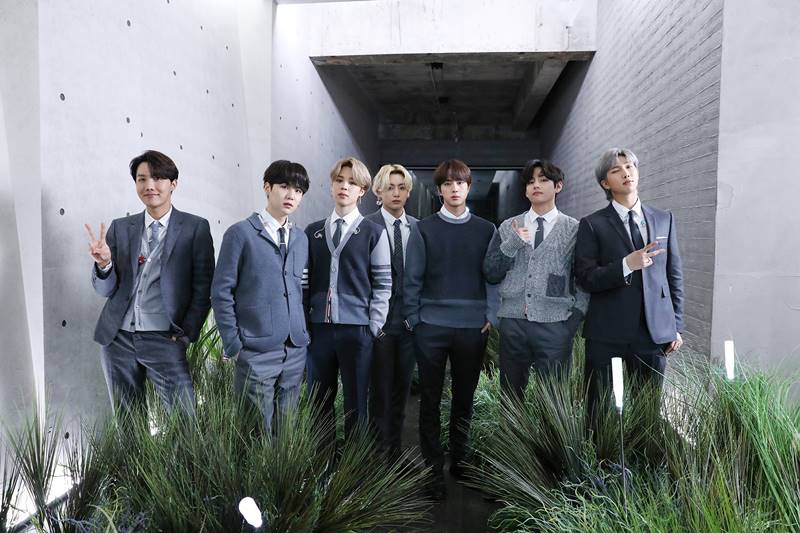By Jae-Ha Kim
Teen Vogue
March 31, 2021
In this op-ed, writer Jae-Ha Kim examines BTS’s recent statement calling attention to anti-Asian racism. Content warning for discussions of racism and use of a quoted slur.
When BTS released their statement Monday evening decrying racism, they unequivocally showed their support for the Asian American and Pacific Islander (AAPI) community. It was a stunning acknowledgment, not because the septet isn’t socially aware, but because they are. The group must’ve known how their words could backfire on them — how naysayers might accuse them of jumping on the social justice movement du jour. After all, what would a privileged group of millionaires based out of South Korea – one of the world’s most ethnically homogeneous countries — know about racism?
Those skeptics forget that racists view BTS as nothing more than a group of “chinks.” A German radio personality compared them to COVID-19, and one of Howard Stern’s sidekicks made a similar comment. In their statement, the band said they faced discrimination as Asians and endured expletives. It’s not out of the question to extrapolate that they also read the racist comments left after every U.S. television appearance – and sometimes even in the articles that were written about them by outlets that should’ve known better.
Within a beautiful statement that showed their solidarity with Asian diaspora, BTS recalled how they, too, were belittled outside of their homeland because they are a Korean group. But they made it clear that what they faced was of lesser concern to them than what is happening to Asians overall.
“Our own experiences are inconsequential compared to the events over the past few weeks,” they collectively wrote. “But these experiences were enough to make us feel powerless and chip away our self esteem. … We stand against racial discrimination. We condemn violence. You, I and we all have the right to be respected. We will stand together.”
#StopAsianHate#StopAAPIHate pic.twitter.com/mOmttkOpOt
— 방탄소년단 (@BTS_twt) March 30, 2021
Two weeks ago, a white shooter killed eight people in Atlanta. Though six of the victims were Asian American (and four of the six were Korean American women), authorities were quick to repeat the gunman’s words that it was his “sex addiction” that was the impetus for his killing spree and not his anti-Asian hate.
I can understand why BTS waited a bit before taking a stance for AAPI rights. As Korean nationals, they likely know there is a difference between the discrimination they’ve faced as visitors to the U.S. and the racism Asian Americans face simply for existing. They may not have wanted to talk over Asian Americans who were going through unified grief. But by speaking out when they did, they amplified our voices at a time when media coverage was waning. They are most certainly cognizant that because of their popularity and fame, their words will be covered by media worldwide.
Like many Koreans, the members of BTS and their management company may have extended family members who immigrated decades ago to the United States seeking a better life. We were considered the lucky ones back then — the ones who escaped poverty and were promised safety and happiness in Migook (미국), which is the Korean word for the U.S. and literally translates into beautiful country.
My parents didn’t react to racism the way my peers and I do today. They had a sense of gratitude that we were allowed to live here. They never talked about the racism they faced, though my sister remembers teenage boys saying ah so to my mom, and my mother pretending it didn’t bother her, because she didn’t want us to be upset. They’re just words, she would say, and it’s best to cham-eula — which roughly means holding in your own feelings to maintain peace. And when racists belted my father with rocks as he was sitting in his American-made car, he stopped driving with his windows rolled down, even though we had no air conditioning.
After decades of this, we’re saying, F*ck that sh*t. Prominent Asian Americans like Oscar-nominated Minari star Steven Yeun tweeted, “We belong here. Don’t ever think otherwise.” And bestselling Pachinko author Min Jin Lee echoed his sentiment: “I belong here. America is my country. For those who may hate me because of my race, I have news for you: I’m staying.”
We belong here. Don’t ever think otherwise.
— steven yeun (@steveyeun) March 30, 2021
I belong here. America is my country. For those who may hate me because of my race, I have news for you: I’m staying.
— Min Jin Lee (@minjinlee11) March 30, 2021
There are many forms of anti-Asian hate, with physical violence grabbing the biggest headlines. We as a society have been conditioned that racism doesn’t really exist unless it’s blatant and bloody. That complaining about microaggressions is whiny. That hateful words should be ignored.
That it’s our burden to simultaneously accept all the anger and educate racists – some of whom say we don’t really have much to complain about since we’re wealthier than anyone else (we also have the widest income gap of any race), are better educated than everyone else (not true), and enjoy as much privilege as white people (what?!).
Ignorance isn’t equivalent to racism. But ignorance fuels racists, which is why public figures repeatedly mock BTS under the guise of edgy humor. It wasn’t lost on fans that when Topps promoted their line of Garbage Pail Kids Shammy Awards sticker cards – which included fellow Grammy nominees Taylor Swift and Billie Eilish – BTS were the only artists depicted as beaten and bloodied. This was a bad look, considering that Asian Americans are literally being beaten, bloodied, and killed. (Due to the controversy, Topps removed the cards.)
Two years ago, I was invited to attend Variety’s annual Hitmakers brunch, where BTS was honored as Group of the Year. I was all set to go, but at the last minute wasn’t able to attend. In the time since, I’ve regretted that decision — maybe if I had gone, they would have had someone Korean to talk to, someone to make them feel comfortable in a music industry that has often cast them as outsiders. What was to have been a monumental moment for the band was marred by (since scrubbed) video footage, where a woman can be heard mocking the group’s appearance and their entourage. Later, photos of the group circulated that showed them sitting together and looking uncomfortable, almost as if they were “exotic” animals to be gawked at but not engaged with.

Microaggression passed off as curiosity is the bedrock of racism. When a reporter is flown overseas (pre pandemic) to write a cover story about BTS and starts his article off by bragging about how he knows absolutely nothing about the group, he is literally gloating that his assignment is beneath him. And when a friend asks if you’ll take care of their dog while they’re on vacation, but please don’t eat him haha, they are crudely saying that we are not as civilized as their cow-eating selves. Americans don’t eat pets, right? Racists don’t view Asian Americans as Americans, but as perpetual foreigners.
In their next go-round of press, I fear that the silly questions that BTS have politely answered in the past (Which American artist do you want to collaborate with? What’s your favorite American food?) will be replaced by invasive queries asking them to detail the racist trauma they’ve endured, without concern about the emotional toll it takes on people of color to recount their experiences. Those words will be capsulized into neat sound bites by journalists who, more than likely, have never experienced racism of any kind.
During one of our first days as new immigrants in the U.S., my parents took us to McDonald’s as a treat. While standing in line, I asked them why the other children were pulling up their eyes and making ching chong chang noises at us. We had never witnessed that kind of behavior in Seoul. My mother said it was because we were so cute and they wanted to be like us, which was an answer I accepted as a four year old.
But no longer. Not now, not ever again.







I may have shed tears while reading this well-written, hard-hitting piece. Go read, ARMY (but be ready for the emotions).
“We as a society have been conditioned that racism doesn’t really exist unless it’s blatant and bloody. That complaining about microaggressions is whiny. That hateful words should be ignored.”
This.
Beautifully written article.
“My parents didn’t react to racism the way my peers and I do today. They had a sense of gratitude that we were allowed to live here.”
This was such a heartbreaking read, hitting so close to home. But very well-written and unfortunately an accurate depiction of the AAPI experience
Wow. This is beautifully written and actually broke my heart more than a little.
Thank you so much for writing this!!! You take what I’ve been feeling (a hot mess) and turned it into something coherent. Very powerful, and so appreciated.
A powerful essay on racism, micro aggressions, and our refusal to tolerate any of it anymore.
Thank you,
@GoAwayWithJae